Greece's migrant fruit pickers: 'They kept firing. There was blood everywhere'
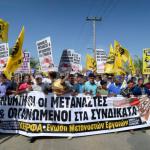
Is a man worth nothing when he is branded illegal? Tipu Chowdhury has spent the past 17 months wondering. The answer has not been easy. Even now, after being forced to endure subhuman living conditions, after being starved and worked like a slave, the Bangladeshi does not speak ill of Greece. Instead of anger, there is resignation, an almost fatalistic acceptance that this is the life meted out to those who go "undocumented".
Had he and his fellow strawberry pickers not been shot at – had the case not reached the courts and the men who did the shooting not been scandalously freed – he might not have pondered the question at all.
"When they pointed their guns at us, and there were around 200 of us gathered in that space, we thought they were joking," says Chowdhury of the April 2013 attack. "After all, we hadn't been paid for more than five months. We couldn't believe it when they actually began shooting."
This week, unions, anti-racist groups and peasant workers' associations will launch a solidarity campaign in support of the Bangladeshis, starting with a mass demonstration timed to coincide with a speech the Greek prime minister, Antonis Samaras, will give on Sunday outlining the government's economic policy at the international trade fair in Thessaloniki. As preparations get under way, 33-year-old Chowdhury has found himself reliving the events of that day, one that would go down as the worst assault in Europe on migrant workers in living memory.
The sun was setting when the Greeks turned up at the camp. There were three of them – two armed with shotguns, one with a pistol. The Bangladeshis knew the men well. All three worked for Nikos Vangelatos, a wealthy fruit producer who had made a fortune cultivating strawberries, mostly for the Russian, German and UK markets, on the great plains that surround the nondescript town of Nea Manolada in the western Peloponnese. From 6am to 7pm, it was they who stood guard, occasionally barking orders but mostly obscenities as the labourers, in army-like formation, picked their way in the steaming heat from plant to plant, greenhouse to greenhouse, across the "fields of blood".
Small, wiry and dark, Chowdhury recalls the bullets skimming past his right leg as the men opened fire – just as he can recollect the events leading up to the attack.
"We were meant to get €22 a day, minus €3 for food and €3 for our living quarters, but every week we were told: 'Next week we'll pay you', and every month it never happened," he says, his white hand-me-down leather shoes slipping from sockless feet.
"Earlier that day, me and three others had gone to see Vangelatos in his office in Lapa [near Manolada] and we said: 'Look, we have to be paid because we need to support our families back home.' And he said: 'We can pay you, but you have to tell the rest to wait.' We had already gone on strike twice and that's when we decided: 'That's it, we are going to go back to the camp and tell the others the truth.'"
The Bangladeshis were in their makeshift tents – places that no one could call a home but which the migrants, in a bid for some kind of dignity, had built with cardboard boxes, nylon and bamboo – when the men arrived.
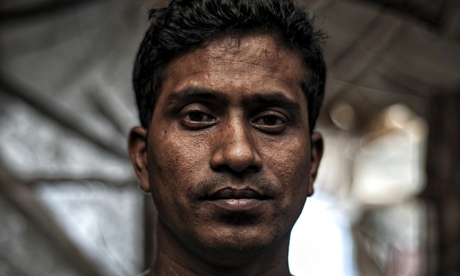 Tipu Chowdhury: 'Every week we were told: "Next week we'll pay you", and every month it never happened.' Photograph: Panagiotis Moschandreou for the Guardian
Tipu Chowdhury: 'Every week we were told: "Next week we'll pay you", and every month it never happened.' Photograph: Panagiotis Moschandreou for the Guardian
The young migrant workers were worried. Like Chowdhury, they had paid smugglers thousands of dollars to reach this promised land in the hope of wiring money to their families in Bangladesh. Chowdhury managed to send back €2,000 (£1,600) in total before his wages stopped. Now that they were here, in a country that was, itself, crushed by economic crisis, there was one inescapable fact. As state-declared "illegals," without recognised papers or permits, they had no rights. They could go to the authorities but the authorities wouldn't care because, officially, they did not exist. And, this time, their armed overseers were not just angry; they were seething with rage.
"The month before, they had killed the two dogs we kept in the camp," says Lynton Khan, Chowdhury's friend. "And when they shot them dead they said: 'This is how we will deal with you.'"
Then, in April, the men returned following Chowdhury's ultimatum. "They said: 'Collect your things; if you don't want to work, we've got others.'" The heavies had brought a small group of new recruits to work the fields. The existing pickers feared they would lose their jobs. "At that point we left the camp and walked over to the field as well because we were so shocked at what we were seeing," says Khan.
Chowdhury was in the foreground when the shooting began, which left 35 injured, four critically. "When they started firing and the shot and bullets began to fly, we all started howling and crying, 'Help', 'help,'" he says, for the first time breaking into halting Greek, his eyes fixed on the ground. "But they kept firing and there was blood everywhere, people lying head-down in the field as if they were dead."
As the assailants fled panic-stricken, Khan reached into his pocket for his phone. He called the police. Within minutes, officers and ambulances were on the way.
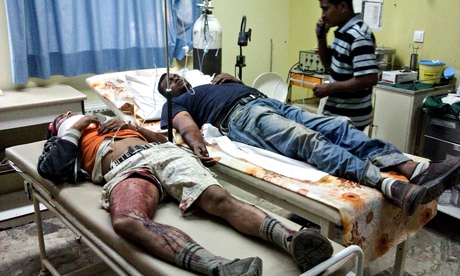 Two of the victims of the shooting are attended to in hospital. The three men who shot them, plus the farm's owner, were acquitted in July 2014. Photograph: AFP/Getty Images
Two of the victims of the shooting are attended to in hospital. The three men who shot them, plus the farm's owner, were acquitted in July 2014. Photograph: AFP/Getty Images
For Moisis Karabeyidis, the lawyer who would go on to represent the pickers, it was a seminal moment in the drama that so often engulfs the exploited underclass of migrant workers in Greece. "Precisely because these people lacked any social contract, with no rights or protection, they had no recourse to justice," he tells me, banging the steering wheel of his car as we drove from Patras, western Greece's provincial capital, to the strawberry fields of Manolada. "That we got to the courts, that the case was sponsored by United Nations High Commissioner for Refugees (UNHCR), that the migrants were defended at all in a country where xenophobic attacks are so very common is, in itself, a big thing."
Not since the infamous incident in Kililer, when a revolt against landowners and their privileges saw four farmers killed and dozens injured in March 1910, has any worker been shot in Greece.
The attack in Manolada, more than 100 years later, would go down as the worst in modern times. It would also throw a light on the appalling conditions in which cheap migrant labour is employed to toil Europe's agriculturally rich southern land.
Yet far from ending the drama, a court decision announced in July acquitting all four men, including Vangelatos, of charges ranging from grievous bodily harm to forced labour, has only served to stoke the fire further. Even the shooters were allowed to walk free, with the option of paying off their initial prison sentences of 14 and eight years upon appeal. "The verdict was reached in a record 15 minutes and the three-member panel of judges didn't even bother to explain their motives," says Karabeyidis who, on hearing the ruling, said: "I am ashamed to be Greek."
"Vangelatos had a nine-strong team, which included some of our best criminal lawyers. We were two. It was David versus Goliath. Our only hope, now, is that the supreme court steps in and orders a new trial."
Disbelief in Greece has been matched by dismay abroad. How, asked critics, could a mixed-jury court allow the culprits to walk free? Was justice itself falling prey to the menacing mood of rightwing fanaticism that has pervaded the country with the inexorable rise of neo-Nazi Golden Dawn?
Outside Patras's freshly painted, neo-classical courthouse, Chowdhury felt the ground slip from under his feet as news of the verdict filtered out. "When we heard that decision, everyone began weeping," he says, still plainly numbed. "For a few seconds, I could see nothing in front of me; everything went blank and then, when I came to, all I could think is: 'It can't be, it can't be.' Is there no justice? Does a man have no rights?"
For those who have had a glimpse of how "illegal" migrants work in the fruit fields of Greece, the answer would be a resounding "no". Egyptians, Rumanians, Bulgarians and Albanians have all passed through Manolada, a town as famed for its seasonal workers as the luxury cars owned by fruit farmers. At the height of the harvesting season, between October and July, an estimated 6,000 migrants are employed as strawberry pickers for wages that no Greek, despite record levels of unemployment, would ever accept.
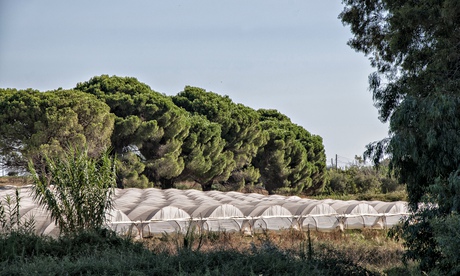 Polytunnels near Nea Manolada where the migrants worked for €22 a day. Photograph: Panagiotis Moschandreou for the Guardian
Polytunnels near Nea Manolada where the migrants worked for €22 a day. Photograph: Panagiotis Moschandreou for the Guardian
The vast majority are Bangladeshis because fruit firms have discovered that they are nimble and can fill crates the most quickly. But, with rare exception, almost none of them own the papers that would provide them with any rights.
"It's a multimillion-euro business that has made a lot of people rich around here," says Dimitris Peppas, an anti-racist activist who lives in the adjoining town of Amaliada. "We're talking about a huge market whose profits migrants never see. It's the producers and the people who work for them, the guys who drive the Porsche Cayennes, who get it all."
Peppas, a motor-bike mechanic who spent 11 years living in Germany, says he has been sickened by the way the Bangladeshis have been treated and so he has ensured they had clothes and food. "I know what it's like to be a foreigner abroad – the helplessness and loneliness of it all," he sighs. "What these people have had to endure is intolerable and yet they have not wallowed in self-pity. They have maintained a level of dignity that is extraordinary, really."
He is far from being alone in the region. Last week, an assortment of unionists, leftists and migrant support groups gathered in the Patras Workers' Centre to debate how best to promote the plight of the Bangladeshis.
"What is certain is that this shameful court decision has to be reversed," said Ourania Birba, a city councillor with the radical left main opposition Syriza party. "Our enemies have been more organised than us," she railed from the raised stage of the centre's ramshackle amphitheatre. "There are dark forces out there, seeking to prevail."
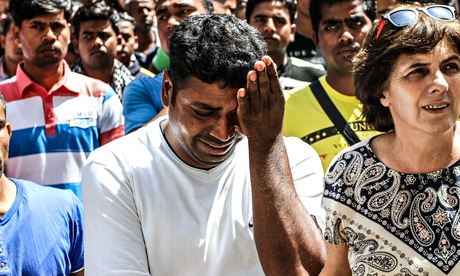 The shock of the verdict kicks in outside the court in Patras in July 2014. Photograph: Menelaos Mich/Demotix/Corbis
The shock of the verdict kicks in outside the court in Patras in July 2014. Photograph: Menelaos Mich/Demotix/Corbis
With summer's end, anti-fascists fear that Golden Dawn is back on the march. Despite being exposed as a criminal organisation, with most of its leadership placed in pre-trial custody, the extremists performed surprisingly well in local and European elections in May. Ominously, black-shirted hit squads have made a comeback with a spate of attacks in recent weeks on gay people and dark-skinned immigrants.
"It is a very worrying turn of events," says Petros Constantinou, a leading anti-racist campaigner in his air-conditioned office in Athens. "They are coming back because the coalition is desperate for votes ahead of presidential elections next year. On prime pieces of legislation, such as the anti-racism bill, amendments are being made because of Golden Dawn. That is giving the fascist front new confidence, new life."
Back at the camp, within view of a gas station on the national road that criss-crosses the Peloponnese, Chowdhury explains how he risked his life to get to Greece in November 2007 – hitch-hiking across Iran, trekking across Turkey, dodging bullets at the border the two countries share.
It was a journey that he and his seven siblings had agreed on early in life. "My village, Betauka, is surrounded by rice paddies but has been badly hit by typhoons for years," he tells me. "My older brother, Jebu, got a visa to America after winning the lottery [organised by the US embassy in Dhaka]. For 18 years, he has worked in a belt factory in Michigan. He was the one who gave me and my younger brother, Juman [now in construction in Saudi Arabia], the money to pay for our journey here."
It took six weeks of flying, driving and walking before Chowdhury was finally ushered by traffickers on to a boat bound for Greece. "It was so cold. We could only walk at night to avoid being detected and one of my friends died on the way," he said. "But every time I crossed a border, I was so happy; I felt reborn. When I got here, I thought I have landed in the country where democracy was born, the country of civilisation."
Does he still feel the same? We take in the camp that he has been forced to call his home for nearly two years. At its lower end are three big holes, covered with nylon sheets, which are the repositories of human excrement. In between roam chickens, cats and dogs. In the middle is a vegetable garden and all around fly-filled shacks, without electricity or running water, that serve as the migrants' living quarters. For the pickers there is nowhere else to go. This wretched existence is the only thing on offer. "I think I'd like to go home now," Chowdhury says. "My family want me back. But what has happened is an injustice and I can't carry it around for ever. It would kill me if I did. It is a wrong that has to be put right first."
